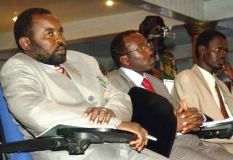Darfur rebel confident other factions will join peace deal
May 12, 2006 (CAIRO) — The chief of Darfur’s main insurgent faction, who signed a peace agreement last week with the Sudanese government, said Friday he was confident the two other rebel factions would reconsider their rejection of the deal.
 “I think both movements will sign the agreement,” Minni Minnawi told The AP on the telephone from Chad.
“I think both movements will sign the agreement,” Minni Minnawi told The AP on the telephone from Chad.
Minnawi, who heads the main branch of the Sudan Liberation Movement (SLM), signed the peace deal last Friday in Abuja, Nigeria, after a last-minute push from U.S. Deputy Secretary of state Robert Zoellick helped conclude six months of negotiations.
But another faction of the SLM lead by Abdelwahed al-Nur refused to sign the accord, aimed at ending a conflict that has killed at least 180,000 people and displaced more than 2 million. The smaller Justice and Equality Movement also refused to sign.
“I’m expecting Abdelwahed al-Nur to sign the agreement in the days to come,” said Minnawi. “As for the Justice and Equality Movement, it is quite likely to happen soon also,” he added.
“When it happens, it will be a very big victory for Darfur,” said Minnawi, who had just met with the Chadian president to discus border security and a timetable for the repatriation of some 400,000 Darfur refugees living in Chad.
Nouri Abdallah, the spokesman for al-Nur, said on the telephone from Nigeria he could “neither confirm nor deny” reports al-Nur might change his stance.
In Abuja, African Union (AU) spokesman Sam Ibok said Thursday the AU had received a letter from al-Nur, indicating his conditions for joining the deal. Ibrahim Mabido, a negotiator for Nur’s faction, said the issues raised in the letter include the disarmament of the Janjaweed Arab militia and power sharing.
U.N. Special envoy to Sudan, Jan Pronk, also said there had been several high level discussions this week to convince leaders from the dissident factions, as well as military commanders on the field, to accept the agreement.
“Broadening the circle of support for the agreement is the top priority,” he said on the telephone from Khartoum.
“I would not exclude progress in that direction soon, it’s a necessity that everybody understands,” he said.
Darfur, a vast region of western Sudan, has been torn by violence since rebel groups made up of ethnic Africans rose up against the Arab-led Khartoum government in 2003.
Arab militias known as the Janjaweed, said to be backed by Khartoum, have carried out a wave of violence against ethnic African villages and are accused of widespread atrocities. Khartoum denies backing the Janjaweed.
Ensuring the Janjaweed respect the ceasefire agreed last week is key to convincing Darfur rebels to comply with the peace deal, but there have been several Janjaweed attacks since then, said Pronk. “And I am afraid this will continue for some time,” he said.
Minnawi said his troops were waiting to see whether the Janjaweed were serious about implementing the peace agreement. “We certainly won’t disarm until we see them do so,” he said.
Pronk said getting the smaller rebel groups on board was crucial because there had recently been increased cases of infighting among rebels.
He said he wasn’t in favor of immediately inflicting sanctions on field commanders still fighting, because they hadn’t yet all been informed of the peace agreement. “But people who are impeding the peace process could be sanctioned,” in accordance with U.N. Security Council resolution 1591, he said, describing as “cowards” the commanders who refuse to comply with the peace agreements and continue to kill civilians.
“There has been further deterioration of the human rights situation since February,” he said.
“That peace has been signed in Abuja doesn’t mean everything is fine or that there will immediately be peace on the ground,” he said.
(ST/AP)
